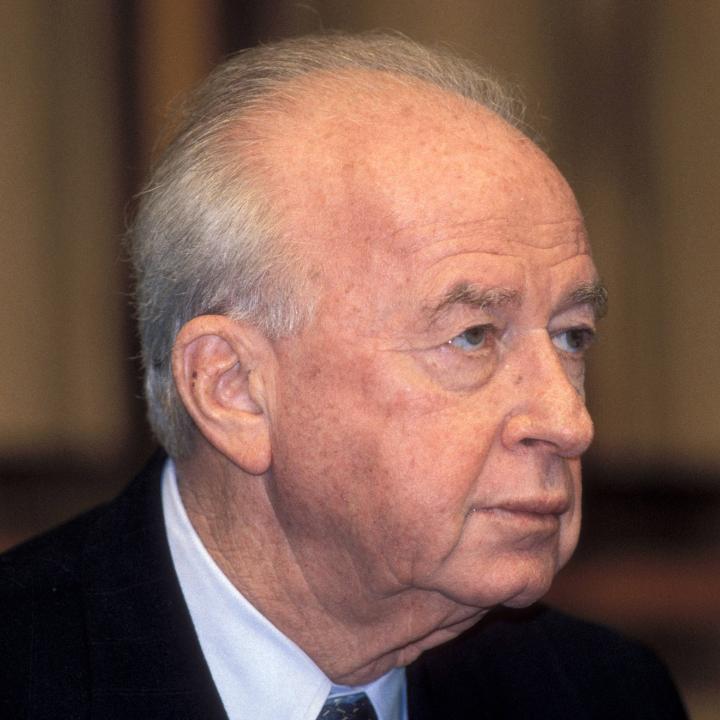
- Policy Analysis
- PolicyWatch 3783
An Inside Look at Rabin’s Oslo Expectations

Part of a series: Oslo at 30
or see Part 1: Oslo at 30: Personal Perspectives from Washington Institute Scholars A Compendium
A previously classified cabinet transcript reveals a mix of shrewd judgments, prophetic concerns, and miscalculations by the late prime minister.
This PolicyWatch is based on the author’s remarks at the September 11 Washington Institute Policy Forum “Oslo at 30: Looking Back and Ahead.” To watch video of the forum or read insights from other speakers, see the event page.
Recently, Israel declassified the transcript of the landmark 1993 cabinet meeting at which ministers debated the first Oslo Accord, the product of secret negotiations with its avowed enemy, the Palestine Liberation Organization (PLO). Held August 30 of that year, days before the agreement was signed, the meeting lasted five-and-a-half hours and ended with officials approving the proposed terms by a 16-0 vote (with two abstentions). The previously unseen debate adds to the public understanding of Prime Minister Yitzhak Rabin’s thinking at this historic juncture and underscores the depth of his subsequent evolution.
How Oslo Fit with Rabin’s Strategic Priorities
Rabin saw himself as a strategic thinker, and nothing excited him more than contemplating the direction of the Middle East and its wider implications for Israel. In his view, the end of the Cold War and U.S. military intervention in the Persian Gulf represented a strategic windfall of historic proportions. He generally saw the Palestinian issue as second-tier in terms of national security, albeit still critical to Israel’s future. He was more drawn to a potential peace deal with Syria given its potent armed forces and history of war with Israel. Yet the Syria track did not advance as he hoped.
More broadly, Rabin felt a need to limit Israel’s conflicts with its neighbors before Iran went nuclear—an issue he focused on before many others did. As such, he linked Israel’s inner circle of potential regional conflict with the outer circle, recognizing that failure to reach understandings with actors in its immediate vicinity could embolden Tehran to make trouble on the periphery.
Regional implications were not the only reason why Rabin eventually prioritized the Palestinian issue, however; he also realized that failure to solve this conflict would endanger Israel as a Jewish and democratic state. Moreover, he saw the rise of Hamas in dire terms, regarding the group as fanatical, opposed to any compromise, and poised to gain ground against the main Palestinian national movement (due in part to the latter’s support for Saddam Hussein during the 1990-91 Gulf War). As he noted at the 1993 meeting, “The rise of Hamas in particular and radical Islam in general in the Arab world is a problem. I think we are seeing this rise among the Palestinians as well. I believe that, in most of the elections in the territories today, Hamas is rising.” (The full Hebrew transcript is available on the Israel State Archives website.)
Rabin was associated with the school of territorial compromise advocated by his mentor and colleague Yigal Allon after the 1967 war, when the hoped-for interlocutor was Jordan. Yet Amman took itself out of the picture in 1988 because of the ongoing first Palestinian intifada. Rabin then hoped to cut a deal with local Palestinian factions in the West Bank, though he candidly admitted they would not move without the entity that was spearheading the national movement, the PLO. Ultimately, he came to believe that the only way to counter Hamas was by reaching a deal with the PLO.
Rabin Saw Gaza Pullout as Reversible
Another key takeaway from the 1993 transcript is that Rabin—virtually alone among the cabinet—viewed Oslo as reversible at first and repeatedly stated that “Gaza is a test case.” In his view, if the Palestinians did not handle the terrorist element, Israel would have to tell them, “Gentlemen, then we are taking care of security.” Understanding this point is important because it highlights each leadership’s sharply different views on what Oslo’s ultimate goal should be: to define a state-in-waiting (as favored by the Palestinians), or to progressively devolve powers based on proven Palestinian security performance (as favored by Israel).
In contrast to Rabin, several cabinet ministers saw Oslo as a vindication of their view that Israel needed to fully extricate itself from the West Bank. Yet the prime minister agreed with them on another crucial point: that the deal would be considered a failure if terrorism continued and Israelis felt unsafe. In that sense, they knew they were betting their government on Oslo’s success; as Rabin bluntly put it, this was a “to be or not to be” moment for his administration. They correctly predicted that massive pushback would emerge from right-wing Israeli settlers and their supporters, and they pledged to conduct a massive public relations campaign on behalf of the deal they were about to strike. Yet they also realized these efforts would matter little to their political survival if Israelis felt unsafe.
The Consequences of Keeping the IDF Out
During the 1993 meeting, Rabin told the participants—who included Ehud Barak, the Israel Defense Forces chief of staff at the time—that he had kept the IDF leadership out of the Oslo backchannel talks because he believed it was wrong in principle to involve the military in a political decision. Had he involved them, his right-wing opponents would presumably have seized upon it as evidence he was politicizing the army. He may also have feared that expanding the circle of officials with knowledge of the talks would risk leaks that could torpedo the process. Moreover, Rabin was known to have great confidence in his analytical judgments and may have believed he did not need the IDF.
Whatever the case, Rabin paid a price for excluding the security establishment. The August 30 cabinet deliberations spent strikingly little time on internal Palestinian politics, perhaps because Israel’s intelligence agencies were not involved in the Oslo process until the implementation stage. This contributed to a crucial misjudgment: although many in the cabinet correctly identified the importance of addressing how the PLO would deal with Hamas, they tended to view this as a question of capacity alone, largely ignoring calculation and political will. Ministers seemed to assume that militarily overpowering Hamas was clearly in the PLO’s interest, and that PLO leaders would therefore prioritize that mission once they were given the necessary resources.
Yet what if PLO officials made a different calculation: namely, to manipulate security cooperation with Israel and increase their leverage in negotiations while simultaneously avoiding deep confrontation with Hamas? No real Israeli conversation materialized about this possibility or related questions of Palestinian political will, so no plans were made for changing the PLO’s cost-benefit calculations on Hamas if necessary. Perhaps Oslo was so much of a seismic paradigm shift that the ministers were unable to see all of the complex permutations waiting just around the corner.
Having seen the agreement for the first time shortly before the meeting, Barak did raise questions about the security arrangements on Gaza and West Bank roads, delineating the myriad challenges of ensuring settler freedom of travel once a new Palestinian entity was given authority over large swaths of territory. Rabin acknowledged these difficulties but argued, “Today you have total control, [but if the Palestinians are granted] autonomy, you have a partnership, and the test is about the partnership. I don’t suggest blurring this.”
The prime minister also noted that he wanted IDF officials involved in future deliberations so that they could provide “professional” assessments of the security implications stemming from Oslo-related political decisions. Indeed, he gave deputy IDF chief of staff Amnon Lipkin-Shahak, his close confidant, a key role in subsequent implementation talks.
Mincing No Words on Final Status
The meeting left no doubt as to Rabin’s views on several other sensitive peace questions. When one minister suggested that Israel might negotiate immediately on the disposition of the territories, Rabin responded that “final status” was impossible at the moment given the parties’ wide differences over Jerusalem, and that forcing negotiations on this issue at the start could lead to an “atomic explosion” politically speaking.
He also understood the political benefits of citing the 1978 Camp David agreement with Egypt as precedent for an interim agreement with the Palestinians, particularly since a right-wing government led by Menachem Begin had negotiated that deal. At the same time, however, Rabin knew that Camp David was at best a limited model for Oslo because there had been no Palestinian representation in those negotiations. Going forward, he understood that direct talks with the PLO would force him to go well beyond the Egypt agreement’s useful but vague formulations.
Rabin was similarly dubious that the Palestinians would hold elections. He told the cabinet that the probability of this happening was “small.”
Rabin’s Subsequent Evolution
By 1995, shortly before his assassination, Rabin no longer spoke of Oslo as reversible. In fact, he warned that if the process failed, the PA and Hamas would join together to fight Israel rather than each other. In an interview with Haaretz that April, he stated, “The alternative to the peace process is its suspension. If that happens, all the Palestinian forces will unite for an enormous effort at terrorist attacks.” He also seemed more concerned about the shortcomings of an interim agreement, telling the interviewer he would prefer separating the populations under a final-status deal: “The reality of mixed populations in which Palestinians from the territories come to Israel and Israelis live in the territories over a widespread area...provides thousands of Israeli targets for terror acts daily.”
Although Rabin’s thinking evolved in some ways, one of his central assessments persisted: that Oslo was the best way to prevent Hamas from dominating West Bank politics and eliminating any peaceful outcome. He concluded, “[If you] leave the situation intact, in which the extremist Islamic elements would increase their power and seize control over the Palestinians in the territories, [it] would leave us without any chance for a political solution.”
David Makovsky is the Ziegler Distinguished Fellow at The Washington Institute, director of its Koret Project on Arab-Israel Relations, and coauthor (with Dennis Ross) of the book Be Strong and of Good Courage: How Israel’s Most Important Leaders Shaped Its Destiny.






